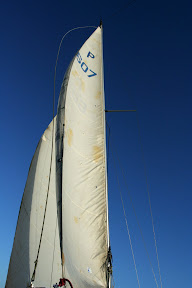We were very, very lucky with our weather: this has been the worst August for many years - one memorably awful day saw enough rain to fill four ordinary weeks. Some of the older people say they have seen worse: but, unless they crewed for Noah, it hardly seems likely.
On this particular day, the window of my office revealed a slow procession of enormous cumulonimbus, dark and vicious, not so much raining as delivery a steady barrage against already-saturated city below. Imagine, then, our wonder, as my guests and I arrived in the little cove where Briongloid swims to stand beneath a perfect blue vault, the only clouds visible being miles away over the city - safely downwind. After weeks of rain, a clear sky seemed something like a miracle.
Mrs. H., a complete sailing novice, agreed to hold the tiller while I cast off the borrowed mooring, and then to pull the tiller towards her when we came free. We slipped loose, I backed the jib, Mrs. H pulled the tiller firmly, and Briongloid teased me with a moment of tortuous hesitation, then cooperated perfectly, turning her head for open water, falling back clear of the buoy. Back in the cockpit, I trimmed her jib, and in a few seconds, we had steerage way, and could escape across the cove on our first tack.
I took the opportunity to give a little lecture on sail trimming, and watching the luff. A sudden cat's paw heeled us over nicely - 20 degrees or so; my pupils were too polite to complain to their instructor about their imminent drownings, but their expressions suggested it was time for a little lecture on the wonders of the fin keel, on leverage, and on the wonderful power of 440 kilos of well-positioned lead to keep the sea in its rightful place; viz, not the cockpit.
In a few minutes, Briongloid had swept clean across the distance that had raised blisters on my earlier row, and as the serrated sandstone of the shore prepared to nibble at Briongloid's skin, I described the motions of changing tack, and told Mrs. H that she could try the manoeuvre as soon as she liked. Round we came: and so neatly was it done, and so nicely was the wind placed, that this tack brought us clear out of the cove.
Noticing that one of the clips that keeps the jib on the forestay was loose, I decided that Mr. H and I should go up to the bows to fix the problem, thinking the experience might be a little adventure for him. I made the distance almost at a trot - not a very good example to set. With a healthy chop meeting our bows at an angle of 45 degrees, and the deck canted at 15 or 20 degrees, the tall Mr. H made a brave and fascinating sight as he followed my lead along Briongloid's lethally narrow side deck while standing fully upright, swaying at incredible angles in all directions, showing a suicidally courageous disregard for hand-holds. To the amazement of all aboard, Mr. H included, Mrs H. was not widowed by this performance; once I had a firm grip on her husband, I congratulated him on his survival and explained the "one hand for the boat" principle.
Then, we started the job that Mr. H almost died for, and we completed it in only twice the time it would take me on my own. Considering that Mr. H was required by me to re-joist the jib while standing full-height on a corner of the well-canted cabin roof, he on the leeward (therefore low) side, and this his first sail, he did very well.

We tacked about a bit, and took some pictures, and watched the sun set. The light on the Old Head blinked at us (2 Fl., 10s), so we practised taking bearings and I showed how they can be drawn onto the chart to give a position. My guests marvelled at the craggy sea cliffs which I had almost stopped noticing, contrasting them with the flatness of Germany's own coastline. Finally, the sun well and truly sunk, we ghosted back into the cove on a dying breeze, breasting an ebb tide while a full moon rose over the sea, and the planet Jupiter blazed to the south. Mrs. H turned onto the mooring with a final flick of the tiller, stopping Briongloid against the ebb as neatly and casually as if she did it every day.
Mr. H rowed us back to the slip by moonlight. The water was stilling now, and we sat quietly in the moon-lit dusk as the oars dipped and rose. At the slip head, we stood to say goodbye: I had been worrying a bit about my guests, and whether the enjoyed the evening - I had worked them hard, taken them into open water, and used enough sail to make Briongloid a little lively for novices, and most likely starved and frozen them into the bargain: then Mr and Mrs H told me that they didn't know how to thank me, and what a wonderful trip it had been, and praised the whole experience so much that I was embarrassed and didn't know what to say.
What I should have said was that it is a real treat to sail with novices for whom even the sea itself is a wonder; and even better, for those novices to be very good company, quick students, and diligent, brave crew. Really, it was my pleasure.
